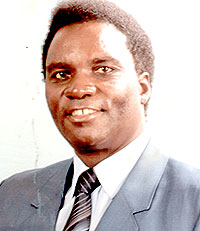Comment: By Izama Angelo
March 28 - April 3, 2004
|
The death of Juvenal Habyarimana, ex-president of Rwanda accused of helping orchestrate the 1994 Rwanda genocide, is once again in the news. The plot of "Who killed Habyarimana" would probably make a great movie one day. In the meantime like Shakespeare's Macbeth, Habyarimana is back to haunt current Rwandan President Paul Kagame and perhaps other " guilty" people in the Great Lakes region.
It begun when a report compiled by a French Judge, Jean-Louis Bruguiere, based upon a police investigation of the plane shooting that killed Habyarimana and President Cyprian Ntaryamira of Burundi, surfaced in a French newspaper, Le Monde, pointing at Kagame.
He is accused of personally ordering the shooting on the 6th of April 1994. There are claims that officers of the Rwanda Patriotic Front who witnessed the purported command by Kagame on that fateful day have either disappeared or gone underground with the truth of what happened. What makes the Habyarimana saga particularly interesting is the list of interested parties and their association to past and present events in this region. Take the United Nations for instance. Evidence linked to the plane crash that killed him surfaced two weeks ago at the United Nations. The world body admitted that a black box believed to be from the plane had been "discovered" somewhere in their stores. A clumsy UN was one of the agencies caught in a slumber as the genocide swept across Rwanda. Now it is once again in the awkward position of playing surrogate to the truth of the dead men. Anyhow, the black box revelations have led to a public "quarrel" between the French who supported the then Rwandan government and President Kagame. In return for the French accusation that Kagame did order Habyarimana's killing, Rwanda accused French soldiers of participating directly in the genocide. Rwanda has also rejected any new information on the black box. Sources in Rwanda government said these claims on Habyarimana's death were nothing new, but constantly revised claims by the same people. It can be said that placing Kagame in a tight spot just weeks to the tenth anniversary of the genocide is one of the results, whether desired or not, of the return of Habyarimana's ghost to its current prominence. Certainly one allegation that the Rwandan government will aggressively fight is claims over the years that RPF took part in counter genocide. And perhaps the negative press over Habyarimana's death is intended finally to blame the Kigali regime for triggering off the genocide and carrying out more killings. As
the 10th genocide memorial approaches, the moral victory for
Kigali would be to sail through these allegations by suppressing
them or diverting attention from them. Already, besides
accusations against the French, the deadline for confessions for
genocide suspects has been extended, scores of common law
prisoners released (to decongest the prisons) and there is the
promise that more genocide prisoners will be set free. So could Uganda come under some form of international inquiry for her role as "midwife" in the genocide? Or could Rwanda be compelled to answer questions about the handling of the genocide as it was unfolding? And what impact will this have on Rwanda's image as a victim of a truly grave crime? And so on. Well, in the matrix of the political and military movements in this region, there are real consequences for this kind of talk. Suspicions are raised, swords could be unsheathed, old hatred's re-ignited. On the ground, action has already returned to the common border between Rwanda, Uganda and Democratic Republic of Congo. Rebels of the Allied Democratic Front seem to have risen from the dead (they were announced defeated by the government) from the jungles of the Congo prompting National Political Commissar Dr Crispus Kiyonga to visit the area to urge the population there to cooperate with the army. As for the eastern Congolese hinterland, it is home to feuding tribes of the Lendu and Hema fame who pledge alliances on whosoever advances their interests. This area if unsecured continues to breed mercenaries, murderers and genocidal maniacs. And, Interahamwe militias reportedly slaughtered villagers in Uvira recently. This former mostly Hutu Rwandan army soldiers from the old regime are blamed hugely for the genocide. Another major area of diplomatic hopes for regional peace built around the United Nations report on the plunder of DRC is also being shaken around this time. A case brought against Uganda, Burundi and Rwanda by the DRC is being revived. President Joseph Kabila's government had agreed to set aside the case in which they are accusing the three countries of plunder, massacre and looting Congo. The decision to let the case be followed efforts by US President George W. Bush who brokered a temporary peace between Kabila and Museveni in November last year. The United Nations Security Council around the same time also agreed to withhold a report by a panel of experts that named specific government officials in Uganda and Rwanda for their participation in the looting of Congo, ostensibly to allow for an out of court settlement of the matter. But a British development organisation is heaping more pressure on this pile of conflicting interests. Last week, the Rights and Accountability group said the companies and individuals named in the Congo plunder have gone unpunished in their own countries and are urging swift action, now if possible from the UN. If Koffi Anan is convinced to release the recommendations of the panel, it will most certainly destabilise the leadership in the accused countries, all this at the sensitive time when Rwanda prepares to mourn its dead and Uganda is sitting on a powder-keg of a political transition. Habyarimana's ghost has certainly come to relive exciting times. One wonders though, what would happen if the mystery of his murder were indeed " solved". |
© 2004 The Monitor Publications
